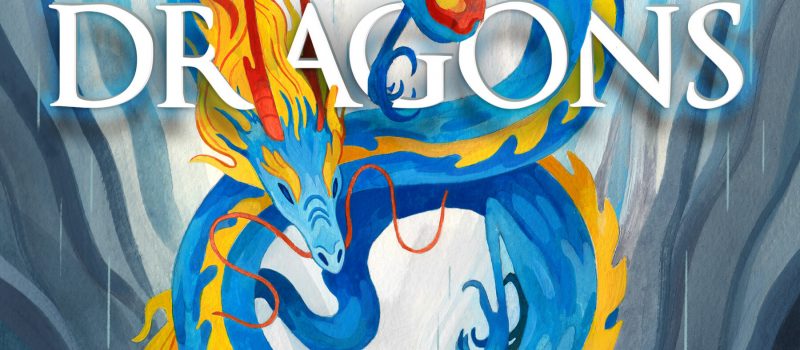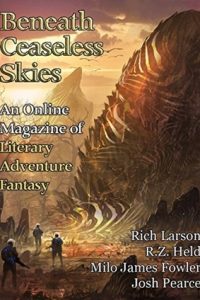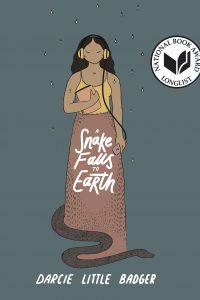Maya C. James Reviews After the Dragons by Cynthia Zhang
 After the Dragons, Cynthia Zhang (Stelliform Press 978-1-77709-174-3, $19.99 160pp, tp) August 2021. Cover by Wang Xulin.
After the Dragons, Cynthia Zhang (Stelliform Press 978-1-77709-174-3, $19.99 160pp, tp) August 2021. Cover by Wang Xulin.
“Shaolong. Throat scorch. Caused by long exposure to poor air quality, especially common in cities with high pollution indexes and poor environmental regulations – the same disease that killed his grandmother.”
Cynthia Zhang’s After the Dragons is a queer SFF novella that follows Xiang Kaifei (Kai), a jaded college student, and Elijah Ahmed (Eli), an American medical researcher, as they search for a cure for shaolong, a terminal lung disease that ravages human populations. Perhaps they can even save the dragons, the former gods and revered beings of the East that now live like stray animals on the streets of Beijing. Focusing largely on climate change, the environment, and its impact on people and other earthly inhabitants, After the Dragons follows the Kai and Eli through science labs and street alleys as they tackle questions of a dying planet and their blossoming love for one another.
Beijing native Kai is terminally ill with shaolong and spends his days rescuing abandoned dragons in the streets. His caring yet stand-offish nature captures the attention of Chinese-American Eli, who is in Beijing to do immunological research before starting medical school and to learn more about the disease that killed his grandmother. Connected through this shared pain and tender kindness for the abused, forgotten dragons, their small yet meaningful attempts to make positive change are quite heroic, even if not filled with intense action scenes or brutal romantic heartbreak. They’re very sweet boys who have found one another through their shared caring for others. While it can be unclear exactly what attracted them to one another, aside from shared interests, it’s not of particular concern in the grand scheme of the story; they simply enjoy one another’s company and want to see one another survive.
Cynthia Zhang’s depictions of Beijing are built in part on Kai and Eli’s conversations about the differences between American cities and Chinese cities like Beijing. This happens quite often, despite their rigorous studies and Kai’s deteriorating health. It’s unclear why they are so fascinated with these constructed differences, and it seems more of an intrusion of the author’s interests than the characters. Yet they both appear to have wandering minds that direct the plot in various, unexpected directions. Kai and Eli are very much focused on their studies, and sorting out their place in a dying world rather than trying to change political systems and prevent planetary destruction. In a way, it makes the book less overwhelming, even if the stakes are still high. They’re average people, but just above-average enough to make an attempt at change a part of their life’s mission.
Due to the generous use of reflective inner dialogue, I found some passages a little too obvious, particularly as it related to Eli and Kai’s thoughts about imperialism, capitalism, and consumption. Not that their critiques of American cultural and moral imperialism and global consumption were unfounded, but they were written in an academic way rather than from the characters’ point of view, which removed me from the story and did not quite fit the rest of the novella’s tone. This wasn’t a fatal flaw, but it made it difficult to get into the story without losing my focus, and made it harder to understand the characters’ immediate, day to day aspirations.
Conversations between Kai and Eli become more relatable and less rehearsed as their relationship deepens and the physical space between them shrinks. It’s quite cute to see the pair grow increasingly comfortable around one another. I’m biased towards romance in SFF, so I can’t give an even and balanced take on whether this took off too quickly or not, I was just thrilled to see it happen.
There are many beautiful moments nestled in After the Dragons – like the subtle, two-sentence summaries that convey how the poor and the wealthy experience natural disasters amid slice-of-life depictions of Kai and Eli’s day to day life in the city. Kai’s walks through the city to search for dragons are a clever way to introduce readers to this fictional depiction of Beijing. The dragons flit in and out of the narrative like color splashes against the polluted city before taking on personalities of their own. Mei is a particularly well-written dragon, even if she has no dialogue – her personality is conveyed well enough that she is just as memorable, if not more so, than some of the human characters in the story.
It was very unusual to read a climate change novel devoid of a looming and sudden global extinction event – there were no large super storms or floods, just increasingly bad air, droughts, and sickness as a result. I quite enjoyed it, even with the slightly too-close-to-home feeling that much of this (dragons excluded) is already a reality for people….
Maya C. James is a graduate of the Lannan Fellows Program at Georgetown University, and full-time student at Harvard Divinity School. Her work has appeared in Star*Line, Strange Horizons, FIYAH, Soar: For Harriet, and Georgetown University’s Berkley Center Blog, among others. She was recently long listed for the Stockholm Writers Festival First Pages Prize (2019), and featured on a feminist speculative poetry panel at the 2019 CD Wright Women Writer’s Conference. Her work focuses primarily on Afrofuturism, and imagining sustainable futures for at-risk communities. You can find more of her work here, and follow her on Twitter: @mayawritesgood.
This review and more like it in the December 2021 issue of Locus.
 While you are here, please take a moment to support Locus with a one-time or recurring donation. We rely on reader donations to keep the magazine and site going, and would like to keep the site paywall free, but WE NEED YOUR FINANCIAL SUPPORT to continue quality coverage of the science fiction and fantasy field.
While you are here, please take a moment to support Locus with a one-time or recurring donation. We rely on reader donations to keep the magazine and site going, and would like to keep the site paywall free, but WE NEED YOUR FINANCIAL SUPPORT to continue quality coverage of the science fiction and fantasy field.
©Locus Magazine. Copyrighted material may not be republished without permission of LSFF.








